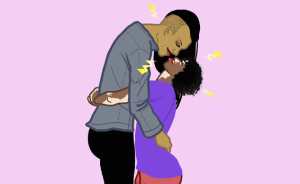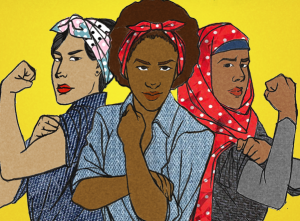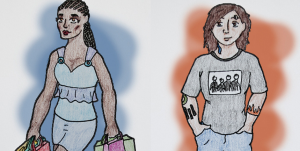
Source: AYI
Whenever I bring up sex with the teens and college students whom I teach, I make a point to tell my classes that sex should never hurt.
I explain that this is true regardless of a person’s gender, irrespective of the kind of sex that someone is having (consensual and desired pain-play notwithstanding), and that it’s also true whether it’s a person’s first or 401st time.
Sometimes when I say this, the class looks skeptical.
Everyone knows that vaginal penetration is supposed to hurt the first time – that it’s expected to be a bloody mess that you should push through (spoiler alert: it’s not). And anal sex? Omigawd, that is like the most painful thing ever, right?
But if you ask me, those notions are really off base – really off base. As in, completely and utterly false.
Yet when this is the message that a lot of people are hearing, and when it’s therefore the real experience of sex that a lot of people are having and not questioning, it can be hard to challenge such beliefs.
Despite the fact that many people are clearly suffering (and if the research is to be believed, painful sex is a very common occurrence), there is a prevalent notion that there are only two times when it is acceptable to acknowledge pain: as the receptive partner during first-time vaginal intercourse or as the receptive partner during anal penetration.
But this idea is flawed on many levels.
Not only should those two situations be pain-free, but there are plenty of other causes of pain that need to be acknowledged as well.
Though a lot of people understand that there are medical reasons for sex to hurt, what is not discussed as often is how patriarchal systems, cultural or religious beliefs, and oppressive ideas about sex can be equal contributors to the problem.
Blame the Messenger
The barrage of contradictory messages that we get about pain and sex often affect our views on the topic.
I remember for me, growing up, my perceptions about what sex was “supposed” to feel like were clearly influenced by what I was hearing from the people around me.
And when my peers and I began having sex in high school, we had multiple conversations about how much it would hurt the first time.
During one of these, two female friends who had recently had vaginal sex griped about how awful the experiences had been
“Oh my god, it hurt so much!” said one. “I was bleeding everywhere.”
“I couldn’t walk right for three days,” moaned the other.
Their admissions were uttered with a combination of anguish and battle pride. So when I subsequently joined their sex-having club and it didn’t particularly hurt, I actually wondered if there was something wrong with me.
Was I “loose” – or maybe doing it wrong?
But it isn’t just teenagers new to sex who normalize pain. From mainstream porn –where women grimace in a combination of agony and ecstasy – to fear mongering over the excruciation of anal sex, the notion that sex often comes with pain is pretty prevalent.
There’s another idea that is also far too common, namely that that women in particular should enjoy (or at the very least tolerate) sex despite pain, and that pain is part of the pleasurable experience.
Indeed we are often fed the notion that rough sex is hot sex, and that being aggressive in bed is a display of passion. And while a lot of people do enjoy rougher sex – which is great! – roughness doesn’t have to cause unwanted pain.
Taken together, all these factors contribute to a situation where many people put up with pain rather than shatter the illusion that the sex they are experiencing is in any way lacking.
Why We Just Don’t Talk About It
It can be hard to pinpoint exactly what percent of the population is having painful sex. But the reasons why it’s hard to get a clear idea of numbers are similar to the reasons why the problem can exist in the first place.
As the authors of a paper published in the Journal of Sex Research write, “One possible explanation for these divergent numbers is that prevalence rates vary by age group and culture.”
Culture is definitely a big factor. Just think about how sexual pain might be interpreted by people who are part of a community that performs genital cutting. The result of this practice is often chronic pain with sex. This then becomes the expected, and even intended, result.
Or consider someone whose religion teaches that sex should be purely procreative. In this case, the only legitimate “problem” one can acknowledge with sex is the inability to get pregnant.
On the age front, very young people whose bodies have not yet matured may just not have a way to have vaginal sex without pain. But since a lot of youth have sex, but no adult to talk about it with, admitting to pain would also be admitting to sex they aren’t “supposed” to be having.
Then there is the other end of the age spectrum. Women are hit over the head with the message that they will no longer be sexually attractive after a certain age.
So if sex becomes painful as a result of the normal changes to the vagina that occur during menopause, acknowledging this may seem like an admission that they are past their prime.
Of course, it’s not only older women who may worry that admitting to painful sex detracts from how sexy they are perceived.
As Cory Silverberg, an author and sexuality educator who runs About.com’s Sexuality site points out, this can be issue for just about everyone. He says:
“Social rules, norms, and expectation equate physical pain or limitations with a lack of sexual appeal or desirability. People of all genders often stay silent about the pain they experience during sex because we all think that talking about it will make us less desirable.”
Indeed, though many women have learned that sex is an unpleasant chore that is owed to a partner, a lot get almost the opposite message: that their sex appeal is directly related to how sexually adventurous or open they appear to be.
Conversely, many men are taught that sex is supposed to be a powerful expression of virility, which they should seek out at all costs, and that anything that impedes this is a direct attack on their masculinity.
Given all these situations, it’s no wonder people are avoiding the conversation.
When Painful Sex Is Seen as Inevitable
There are a number of circumstances under which a person might believe, or be lead to believe, that they should expect sex to hurt.
In many situations, people with certain health issues or disabilities are told that pain with sex is inevitable.
Additionally, there is a persistent message that if a person with a disability is sexually active, that person should be grateful that anyone finds them attractive enough to have sex with.
Others feel that they have a duty to have sex with a partner who stays with them “despite” their disability. As a result, many people in these situations learn that they best put up with discomfort.
As one woman writes of having sex with her husband after developing Transverse Myelitis, a neurological disorder that results in paralysis:
“My body cannot move and position like it once did, sensations are gone and not what they used to be, spasms take over at the worst times, and nerve pain can rage and completely halt everything. […] I dreaded sex because I got nothing but pain both physically and emotionally. I fought anger at what I could not do and jealousy towards him. I stayed silent. I was the perfect little martyr because I did not want to hurt him by telling him how much I did not like this part of our life anymore.”
People stay silent for other reasons as well.
For those who have sexual pain as a result of gender confirmation surgery, an admission of discomfort can trigger doubts about the interventions and can sometimes come with accusations from others about the need for such procedures at all.
Individuals with intersex conditions – also called conditions of sex differentiation – may have undergone surgeries or treatments which result in painful sex, but which they are told are “normalizing” (yes, that is the word that is often used in this context!).
To complicate matters further, there has been a long tradition of secrecy surrounding intersex conditions, and many people are either denied the truth about their medical history, or are told to hide this in order to pass as their assigned gender.
The result on the sex front is that if something is painful, people may be reluctant to speak up for fear that doing so would disclose the truth about their bodies.
Another group of people, namely survivors of sexual assault, may also have a complicated relationship to sex and pain. Adult survivors of childhood sexual assault are commonly diagnosed with chronic pelvic pain and conditions like dyspareunia and vaginismus, which result in pain with sex.
Some survivors may fear that revealing pain could also reveal an assault or assaults. For many survivors of sexual abuse, pain may be so deeply associated with sex that it is assumed to be normal and so not discussed.
Whatever the cause of painful sex, for a variety of reasons – including personal beliefs about what sex should look like and societal expectations about what someone’s relationship to sex should be – talking about discomfort with sex may simply not be on a person’s radar.
Plus, not everyone identifies pain with sex as problematic. In fact, many people simply assume that pain is an inherent part of the package of sex, especially if they’ve never experienced anything different.
What You Can Do
Though a lot of people are really shy to bring up sex, telling partners that sex hurts (or that the way they are touching you just doesn’t feel good) are important first steps.
So are things like trying different positions, learning how to get turned on, and even just using lube when needed.
Amy Jo Goddard, a sexuality empowerment coach, has some good ideas for improving sexual communication. She provides a lot of important questions people can ask themselves and offers tips for feeling less defensive when a sex talk come up
And though it is geared towards young people, the advice on communicating with a partner about sex from the organization Advocates for Youth is relevant for people of all ages.
If working on arousal and communication doesn’t work, your next step may be to get a check-up.
There are a variety of medical conditions including dyspareunia, endometriosis, fibroids, pelvic inflammatory disease, Peyronies disease, phimosis, some sexually transmitted infections, and vaginismus that can cause painful sex, and which can often be helped by a medical professional.
The Mayo Clinic has more information on symptoms and treatments for many of these conditions and addresses both those which affect the penis and reproductive tract and those which affect the vagina and vulva.
Ideally, people would get care from someone who is knowledgeable and sex-positive. If you are wondering what that means, the Canadian Federation for Sexual Health has a really great article called “Is Your Health Care Provider Sex Positive?”
Finding a sex-positive health care provider can also be crucial for people with disabilities that can affect their sex lives and whom mainstream health care often assumes will not be having sex.
It’s also really important for anyone who has undergone had genital cutting or is dealing with effects of surgery – maybe due to an intersex condition or as the result of gender confirmation surgery.
Ultimately, however, getting respectful informed care is paramount for anyone who is sexually active.
Of course, for some people, seeking mental health care is the right path. Here, too, looking for someone who specializes in sexuality can be a good starting point. But not all sex therapists are created equal. You might want to check out the American Association of Sexuality Educators, Counselors, and Therapists for some referrals.
Moving Beyond Pain
Obviously, some people like the intensity of sensations that push their pain buttons. But this is a really different thing that the sore, stabbing, burning, raw feeling that a lot of people experience and that makes them just want to get the act over with as quickly as possible.
Being uninformed, lacking sexual confidence, assuming that sex is inherently painful, and bumping up against health care providers who suffer from the same mistaken beliefs can all contribute to the problem.
Like a lot of things in life, sex isn’t something we are all instinctively proficient in. And learning how to have sex, whether it’s to increase pleasure or to decrease pain, can be a complicated process.
But embarking on that process can make a world of difference in someone’s sexual experiences.
[do_widget id=”text-101″]
Ellen Kate is a Contributing Writer for Everyday Feminism. She’s a health educator, sometime writer, and mom. Currently, Ellen teaches human sexuality at Brooklyn College (something she also did at Rutgers University). Ellen also runs About.com’s LGBT Teens site. Before that, she wrote for Planned Parenthood’s teen website and blogged about sex education for gURL.com. More of Ellen’s writing can be found here. Follow her on Twitter @ellenkatef. Read her articles.
Search our 3000+ articles!
Read our articles about:
Our online racial justice training
Used by hundreds of universities, non-profits, and businesses.
Click to learn more




















